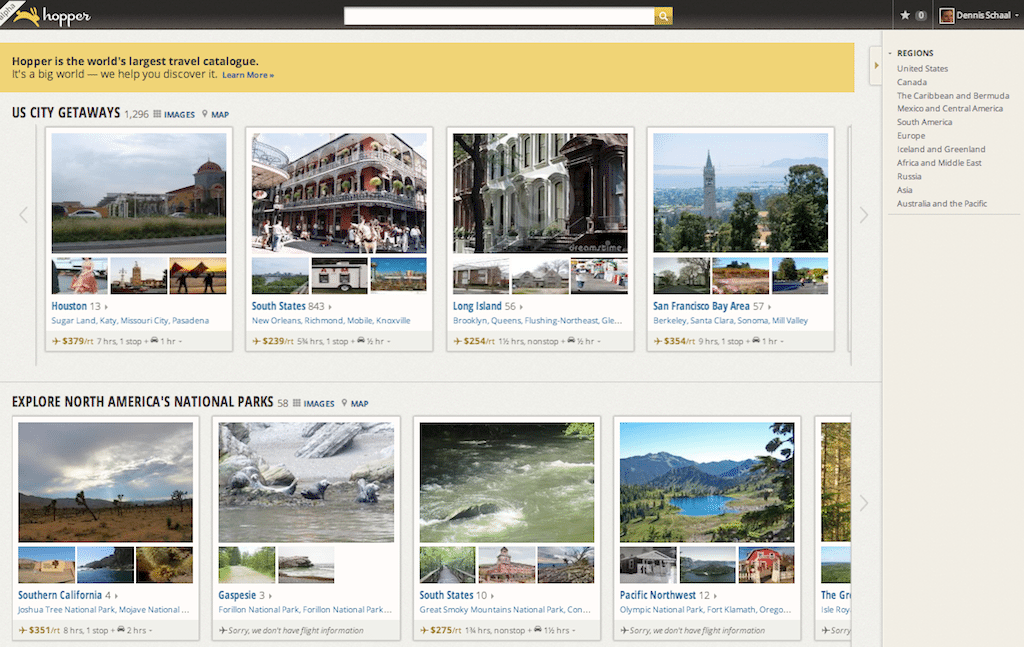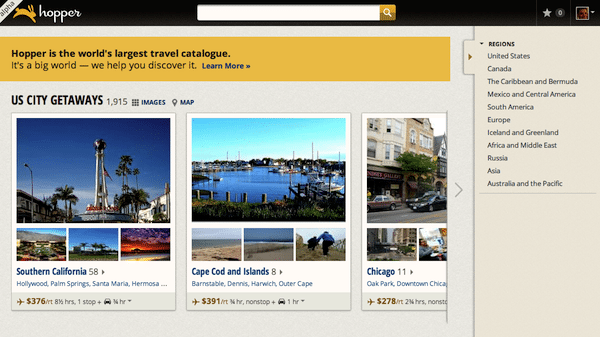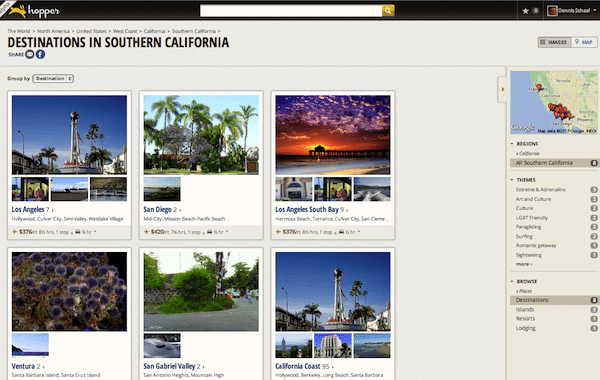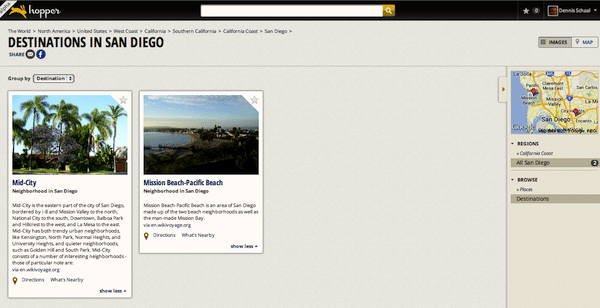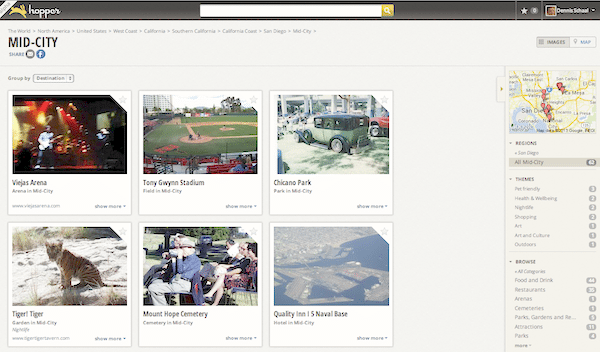Skift Take
After all this, does Hopper really want to bill itself as a "catalogue?" It sounds like a retro brochure or directory. And, despite all the delay and years of work, it appears that Hopper still has a very long way to go before it can deliver a comprehensive and respectable product that is ready for prime time.
After six years, and with $22 million in funding, trip-planning startup Hopper finally debuted its website in alpha mode, billing itself as “the world’s largest travel catalogue.”
The site, which likely is only visible to a segment of users, isn’t as pretty as Pinterest. But, Hopper offers image-led, or alternately, map-based search that you can tweak by selecting desired themes such as wine, hiking or snowboarding, or you can browse by destinations, resorts, volcanos and natural wonders, for example.
In some ways, from its outward appearance, at least, Hopper resembles the bevy of Pinterest-influenced trip-planning or social discovery sites (Wanderfly, Trippy, Gtrot etc., or fill in the blank) that arrived and departed over the last couple of years.
The Hopper homepage presents images of U.S. getaways, including Southern California, Cape Cod, and Chicago, with flights to some cities bookable on Travelocity, others on AirTran.com, and many flight links not working at all. After six years in the making, Hopper states on the site that flight-search is “coming soon!”
When you click on an image, such as Southern California, you view more images of possible destinations such as Los Angeles, San Diego, and Ventura.
Click on San Diego and you see images of two neighborhoods, Mid-City and Mission Beach-Pacific Beach. Select Mid-City and the “show more” option, and you’ll see a blurb about the neighborhood from Wikivoyage, with the added choice to view directions and other nearby attractions.
And, so on and so on. We’ve shown you this in some detail because Hopper is the much-delayed startup that was six years in the making, and it proclaimed a few weeks ago that it had “reinvented the trip-planning experience.”
Also, the alpha is not be viewable to everyone, and the more we navigate around the site, the more it seems possible that it is being shown publicly unintentionally because the content is so spotty, and there are so many features that don’t work properly.
Whether the alpha was released on purpose or not, it provides a clear look into where the much-hyped startup finds itself these days.
Co-founded by CEO Fred Lalonde and CTO Joost Ouwerkerk, Hopper, with offices in Cambridge, Massachusetts and Montreal, has a team of more than 20 people, and pledges to organize the world of unorganized travel data, ranging from blogs to reviews, and pair this newly structured data with billions of airfares to revolutionize the slog that is trip-planning today.
» One Related Link You Really Should Read After This: Hyped Travel Startup Hopper Does Everything Except Actually Launch
Hopper has been promoting itself in a variety of ways over the last couple of years in all kinds of forums in tech and startup circles as the next big thing in travel, with nothing to show for it publicly until last night, and the introduction of its alpha.
You can keep on going and drill down further in the Mid-City neighborhood to view other nightlife activities in the area, as well as hotels, and even Mount Hope Cemetery, and a November 16, 2005, photo essay about it.
From there, if you’ve registered for Hopper using Facebook, you can supposedly save choices that you are interested in and ultimately Hopper would make recommendations, as well. The site in its current form is very glitchy and there are no readily apparent ways to save your favorite destinations, and sometimes you click on things, and get nowhere.
The Hopper Blog, which has seen some turnover in its editorial ranks this year, has reappeared in recent days after a hiatus, as well.
Hopper, founded in 2007 and backed by Brightspark Ventures, Atlas Venture and OMERS Ventures, explains its mission like this:
“What if you could plan an amazing trip based on a vague idea — like ‘spring surfing in California’ or ‘Mediterranean cruise’? What if logistical information popped up right when you needed it, so you wouldn’t have to spend hours on research? This is our vision: to make planning a trip an effortless extension of discovering and exploring new places.
“We spent several years experimenting with different tools, technology and algorithms to collect, organize and manage massive amounts of travel data. The result is a new kind of trip planning engine, powered by the world’s largest structured database of travel information.”
Despite its 2007 founding, these are very early days for Hopper and its much-delayed debut, intentional or not, is only in alpha form.
Supposedly Hopper has great technology under the hood, as the trip-planning engine has organized, and promises to dissect, “the world’s largest travel catalogue.”
That being said, this is a very modest beginning for Hopper at this juncture as there are tons of other trip-planning sites in existence (and, yes, already deceased) that have done much more with less.
The Daily Newsletter
Our daily coverage of the global travel industry. Written by editors and analysts from across Skift’s brands.
Have a confidential tip for Skift? Get in touch
Tags: hopper, trip planning
